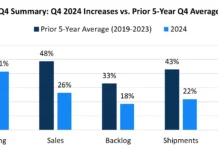By Chris Kuehl, managing director, Armada Corporate Intelligence
Has it been mentioned that the sole function of economic forecasting is to make astrology respectable? This was a rather famous and appropriate quote from John Kenneth Galbraith. It’s not that economists are that bad at forecasting but only as good as the data and when these numbers keep changing it makes life interesting.
Lately, there have been several significant and unexpected changes, and suddenly, the economic picture has shifted – in some positive ways and some not so positive ways.
Change One: Interest Rates
The most important of these changes are interest rates and the potential for decline later this year. Since the start of 2024, there have been assertions that the Fed Funds rate would start to come down from its current level of 5.5%.
The markets seemed to think this would happen by the second quarter despite the fact the Fed never suggested this decision would be made that soon. The assumption was changed, and predictions of a rate cut by the third or fourth quarter dominated.
Now that expectation has been altered by the latest data on inflation, job growth and overall economic progress. Remember the mantra of the central bank, “We raise rates until we break something and then we lower rates to fix what we broke.”
The pressing question is – has the Fed broken anything with these rate hikes? Looking at the data it would be difficult to assert that they have. The unemployment fell back to 3.8% in the latest Labor Department reading and there were an additional 300,000 jobs added. At the same time, the inflation rate ticked back up to 3.5% (from 2.5%). The estimates for first quarter growth originally were less than 2% but now are at 2.4%.
In other words, there is no pressing reason for the Fed to consider a rate cut and now analysts are suggesting that these reductions will not come until 2025. The bond buyers have already signaled they think the European Central Bank will cut their rates before the Fed does. This means that companies counting on rate cuts may have to wait longer than expected. The Fed has not officially declared its intention but the hawks on the Open Market Committee are making a case.
Change Two: Oil Production and Pricing
The second important change involves the outlook for oil prices. It was just a few weeks ago that analysts were confidently asserting that per barrel prices would stay in the $70 to $85 range “in perpetuity” based on the new technology deployed in oil production. It now was possible for producers to react almost instantly to changes in the spot price per barrel. There was a little Asterix with that assertion – pending geopolitics.
In the last few weeks, geopolitical concern has come front and center, and prices have soared into the $90s again and analysts are suggesting that $100 and above will be in the future. The bottom line – oil is a globally priced commodity, and it doesn’t matter that the US is North American independent as far as oil production goes.
The US is hitting record levels of crude production (over 13 million barrels per day (bpd)) and consumes around 20 million bpd (that which the US does not produce and gets mainly from Canada and Mexico). The fact is that Iran and Israel are on a collision course and neither seems inclined to back off. Iran now has threatened to shut down the Straits of Hormuz as the Houthi rebels have shut down the Red Sea. If this takes place there is no route for Saudi oil to reach the markets and no way for the production of the other Gulf oil states. That sends the price of oil into orbit and could trigger attacks that escalate that war in a hurry.
The very latest wrinkle in all this, saw the oil markets calm down a bit and conclude that neither Iran nor Israel is ready to make this an all-out war that would drag in many more combatants. The per barrel prices had been spiking and seemed headed for the $90s and maybe higher but now they have settled back to the mid-$80s for the time being.
Change Three: Global Economy
And that’s not all – there is yet another change that will prove economically disruptive. China is facing a serious deflation crisis, and this has combined with the collapse of the property market (as well as the overall stock market).
China has not seen levels of foreign direct investment this low since the early 1990s. The upshot is that China is in economic distress and ordinarily that would trigger reductions in production and subsequent layoffs. China is not about to risk large numbers of unemployed so these operations keep producing and that creates massive surplus.
Given that China still is a command economy where output keeps accumulating and China then dumps it on the global economy. That means a surge of Chinese goods priced lower than they have been in years. This will stall the reshoring effort in the US and Europe. If one buys from China, this is good news but if one competes with China, this is bad news indeed. China has been trying to reduce dependence on exports, but right now, it needs all the business it can get.
Change Four: Tax Wealth
One more issue and change to give some thought to but one that is not yet imminent. The Baby Boom generation has accumulated a great deal of money and has reached the stage where that money may start to end up in the hands of the next generation. There are over 1,000 billionaires over the age of 70, and collectively, they hold over five trillion dollars.
In 2023, there were more billionaires created with inherited wealth than through entrepreneurial activity, and that has not happened in decades. One of two things likely is to happen to that accumulated cash.
Governments are looking at this cash as a windfall they can access with higher inheritance taxes and many are quickly moving in that direction despite the fact this is a most unpopular tax. If the governments succeed in grabbing that money, it will trigger some behaviors on the part of the holders of that wealth. They likely will try to spend it before it can be taxed and that means billions flooding into an economy that already is trying to dampen inflation.
Remember that one of the main triggers of the current inflation surge was the cascade of money that flowed in reaction to the pandemic. If the Boomers try to spend rather than get hit with taxes, there would be a surge that dwarfs the pandemic spend and inflation will resume its upward march – triggering another round of interest rate hikes. This is not yet imminent and may not come to pass if there are no attempts to go aggressively after inherited wealth but given the budget issues facing the government that tax target is tempting.
Chris Kuehl is managing director of Armada Corporate Intelligence. Armada executives function as trusted strategic advisers to business executives, merging fundamental roots in corporate intelligence gathering, economic forecasting and strategy development. Armada focuses on the market forces bearing down on organizations.
More information: www.armada-intel.com





